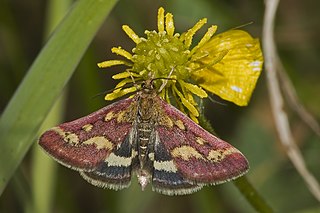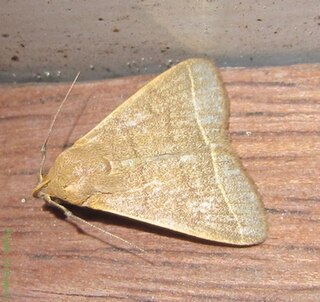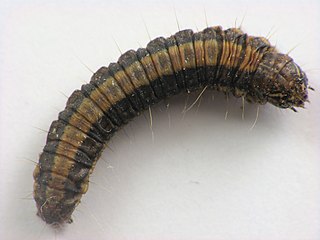
Omiodes is a moth genus in the family Crambidae. Several species are endemic to Hawaii.

Pyrausta purpuralis is a species of moth of the family Crambidae. It was described by Carl Linnaeus in his 1758 10th edition of Systema Naturae

Pachynoa is a genus of moths of the family Crambidae.

Pyrausta is a speciose genus of moths of the family Crambidae. The genus was erected by Franz von Paula Schrank in 1802.

Phostria is a genus of moths of the family Crambidae.

Syllepte is a genus of moths in the family Crambidae.

Simplicia is a genus of litter moths of the family Erebidae. The genus was erected by Achille Guenée in 1854.

The Chrysauginae are a subfamily of snout moths. They are primarily Neotropical and include about 400 described species.

The Epipaschiinae are a subfamily of snout moths. More than 720 species are known today, which are found mainly in the tropics and subtropics. Some occur in temperate regions, but the subfamily is apparently completely absent from Europe, at least as native species. A few Epipaschiinae are crop pests that may occasionally become economically significant.
Neocaphys is a monotypic snout moth genus. Its only species, Neocaphys purpuralis, was described by Hans Georg Amsel in 1956. It is found in Venezuela.
Nausinoe capensis is a moth in the family Crambidae. It was described by Francis Walker in 1866. It is found on the Comoros and Seychelles and in Kenya and South Africa.
Pachynoa hypsalis is a moth in the family Crambidae. It was described by George Hampson in 1896. It is found in Sikkim, India.
Pachynoa mineusalis is a moth in the family Crambidae. It was described by Francis Walker in 1859. It is found in India.

Pachynoa thoosalis is a moth in the family Crambidae. It was described by Francis Walker in 1859. It is found in India, Papua New Guinea and Taiwan.
Pachynoa umbrigera is a moth in the family Crambidae. It was described by Edward Meyrick in 1938. It is found on Java in Indonesia.
Phostria purpuralis is a species of moth in the family Crambidae. It was described by Herbert Druce in 1895. It is found in Costa Rica.
Syllepte purpuralis is a moth in the family Crambidae. It was described by Francis Walker in 1866. It is found in Colombia.
Tatobotys biannulalis is a moth in the family Crambidae. It was described by Francis Walker in 1866. It is found on Borneo and in Indonesia, the New Hebrides, Fiji, Samoa, Japan, Sri Lanka and Australia, where it has been recorded from the Northern Territory and Queensland.

Achilidae is a family of planthoppers, sometimes called "achilids" in the order Hemiptera. There are at least 520 described species in Achilidae.

Margaroniini is a tribe of the species-rich subfamily Spilomelinae in the pyraloid moth family Crambidae. The tribe was erected by Charles Swinhoe and Everard Charles Cotes in 1889, originally as family Margaronidae.













